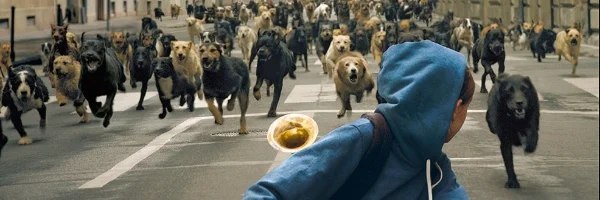White God (Kornél Mundruczó, 2014)
White Dog screens at Chicago's Gene Siskel Film Center for one night only on Wednesday, March 11. For additional ticketing information, please click here.
If Samuel Fuller’s 1982 race-relations and canine parable White Dog contended with social inequality on a micro level, than the spectacle of seeing hounds unleashed on a Hungarian suburb in Kornél Mundruczó’s White God does so on a macro level. Both films relay concerns of social destitution through the eyes of a pooch, and both films are more than a little absurd. But whereas Fuller’s film was calibrated toward personal drama and entrenched within a familiar American racial text, the ambitions of Mundruczó’s film are entwined with its vastness – a town run amok by mutts is a ludicrous but memorable novelty. But as that novelty wanes on, one can’t help but feel betrayed by the film’s failure to realize its thematic intent, subbing modern social concerns for something visually grandiose.
Lili (Zsófia Psotta) is left to her father’s care for the summer. With crossbred dog Hagen in tow, the transition is a tough one, particularly given that her father Daniel (Sándor Zsótér) is not especially welcoming of the visit. Moreover, his tiny flat proves to be too confining for the triad. As a neighbor issues a complaint to authorities regarding the dog, Daniel takes Hagen to the outskirts of the suburb, intent on living out the remainder of the summer without incidence.
A parallel narrative emerges, where Lili ventures off to search for Hagen while Hagen transverses the destitute shambles of the outlying suburbs. Lili, prohibited by the rigid tutelage of her orchestra teacher and the overbearing authority of her father, finds herself socially and economically grounded. Meanwhile, Hagen’s wanderings finds him passing through a chain of rigorous and demoralizing owners, ultimately leading Hagen to a dog-fighting ring that recalls the more vicious scenes of Amores Perros. The perpetual subservience prompts Hagen to mutiny, leading a band of similarly destitute pups in an armada against the community that has wronged them.
The language of subtly is lost on writer/director Kornél Mundruczó, who relentlessly entrenches the audience in the oppressive social circumstances. The allegory of immigrant migration to Europe and the subsequent hostility from the community is a constant, but the methods in which Mundruczó acknowledges these issues are dubious at best. The film operates in dichotomies of exaggerated black and white, with no concentrated effort made to enrich the historical source of such dissension between immigrant and native, impoverished and wealthy, or black and white. As a result, the only thing to really latch onto throughout the film is the impressive canine sequences, which are technically stunning. Sequences following Hagen are especially complex in their visual construction: edited, cut, and composed with so much formal efficiency that one gets lost within the perspective of a dog.
The immersive quality that composes the dog sequences ultimately wanes in effect as the novelty runs its course. And with a neatly packaged ending, White God is strikingly naïve in its social politics. There’s value in the film’s absurdity; it is strange and possesses the rare quality of searing imagery. But there’s a tolerance for this type of ludicrous novelty that varies from person to person and frankly, I was at my breaking point about half way through.

